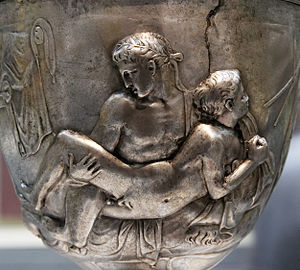Portal:LGBTQ
| Main page | WikiProjects & Things you can do |

|
The LGBTQ+ Portal |

|

|

|
Introduction LGBTQ (also commonly seen as LGBT, LGBT+, LGBTQ+, and LGBTQIA+) is an initialism for lesbian, gay, bisexual, transgender and queer or questioning. It is an umbrella term, broadly referring to all sexualities, romantic orientations, and gender identities which are not heterosexual or cisgender. In the 1990s, gay, lesbian, and bisexual activists adopted the term LGB, supplanting narrower terms such as "gay or lesbian". Terminology eventually shifted to LGBT, as transgender people became more accepted within the movement. Around that time, some activists began to reclaim the term queer, seeing it as a more radical and inclusive umbrella term, though others reject it, due to its history as a pejorative. In recognition of this, the 2010s saw the adoption of LGBTQ, and other more inclusive variants. Some versions of the term, such as LGBT+ and LGBTQ+ add a plus sign, to represent additional identities not captured within the acronym. Many further variants exist which add additional identities, such as LGBTQIA+ (for intersex, asexual, aromantic, and agender) and 2SLGBTQ+ (for two-spirit), LGBTQQ (for queer and questioning), or which order the letters differently, as in GLBT and GLBTQ. The collective of all LGBTQ people is often called the LGBTQ community. These labels are not universally agreed upon by everyone that they are intended to include. For example, some intersex people prefer to be included in this grouping, while others do not. Various alternative umbrella terms exist across various cultures, including queer, same gender loving (SGL), Gender, Sexual and Romantic Minorities (GSRM). (Full article...) Selected article -Japan does not recognize same-sex marriages or civil unions. Several municipalities and prefectures issue same-sex partnership certificates, which provide some benefits, but do not offer equal legal recognition. Polling suggests that a significant majority of Japanese people support the legalization of same-sex marriage or partnerships, particularly the younger generation. Politically, the Constitutional Democratic Party, the Japanese Communist Party, the Social Democratic Party, Reiwa Shinsengumi, and Komeito support legalizing same-sex marriage. Nippon Ishin no Kai also supports same-sex marriage, but believes a constitutional amendment is necessary to legalize it. However, the Liberal Democratic Party, which has been in power almost continuously since 1958, remains opposed to it. On 17 March 2021, a district court in Sapporo ruled the same-sex marriage ban unconstitutional, arguing that laws or regulations that deprive same-sex couples of the legal benefits of marriage constitute "discriminatory treatment without a rational basis" and as such violate Article 14 of the Constitution of Japan. The court also ruled that Article 24 of the Constitution, which defines marriage as "based only on the mutual consent of both sexes", does not prohibit the recognition of same-sex marriages. Over the following two years, five other district courts issued rulings either upholding the ban or declaring it unconstitutional. In March 2024, the Sapporo High Court issued a verdict stating that the same-sex marriage ban violated the Constitution, the first time an appellate court had reached such a conclusion. While these rulings did not legalise same-sex marriage in Japan, it is anticipated that they may pressure the National Diet to act on legislation opening marriage to same-sex couples. Bills were introduced to the Diet in 2019 and 2023. (Full article...) Selected biography -Josef Kohout (24 January 1915 – 15 March 1994) was an Austrian Nazi concentration camp survivor, imprisoned for his homosexuality. He is best known for the 1972 book Die Männer mit dem rosa Winkel (The Men With the Pink Triangle), which was written by his acquaintance Hans Neumann using the pen name Heinz Heger, which is often falsely attributed to Kohout. The book is one of very few first-hand accounts of the treatment of homosexuals in Nazi imprisonment. It has been translated into several languages, and a second edition published in 1994. It was the first testimony from a homosexual survivor of the concentration camps to be translated into English, and is regarded as the best known. Its publication helped to illuminate not just the suffering gay prisoners of the Nazi regime experienced, but the lack of recognition and compensation they received after the war's end. Kohout's book inspired the 1979 play Bent, by Martin Sherman, which was made into the movie Bent, directed by Sean Mathias, in 1997. (Full article...) Selected quote -
—André Gide (1869–1951)
Current events
Selected image - The Warren Cup, a Roman skyphos (drinking cup) featuring two representations of homoerotic sexual acts. It was most likely commissioned from Greek craftsmen between 1–20 CE.
Did you know… -
This month's birthdays
Selected listsRelated portalsFeatured contentThe following articles and lists have been identified as some of the best produced by the Wikipedia community:
TopicsCategoriesAssociated WikimediaThe following Wikimedia Foundation sister projects provide more on this subject:
Discover Wikipedia using portals |






















